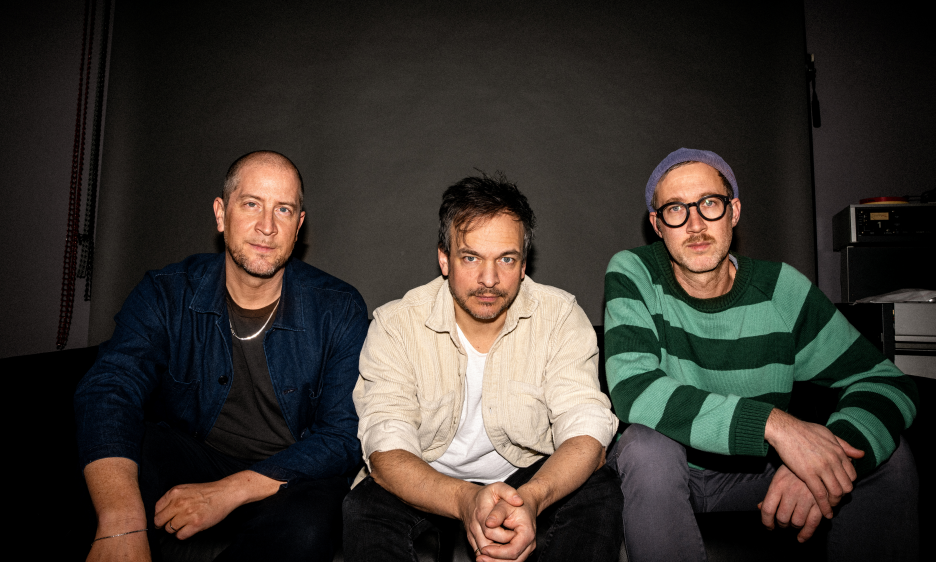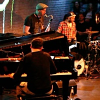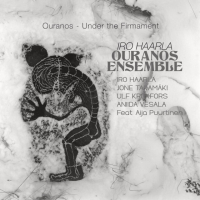Home » Jazz Articles » Catching Up With » Prepared: The Munich Trio Making Minimalism Move
Prepared: The Munich Trio Making Minimalism Move

Courtesy Georg Stirnweiss
When I first heard Steve Reich, I was blown away that music with no traditional forms or improvisation, with only subtle variations over time, could be so exciting... It has a spiritual effect, hypnotizing.
—Chris Gall
The band emerged from Munich's tight-knit music community. "We have known each other from the Munich music scene and have played in different groups for over 20 years," says Gall. "In 2008, I joined Florian's Retro/Jazz/Soul/Boogaloo group, The Hi-Fly Orchestra, and we played many gigs around Europe for almost ten years." Their unconventional instrumentation came from a desire to reset. "We were looking for a new instrumentation to set the controls to zero," Gall says. "Starting from the ground up can be inspiring!" For Riedl, drums were essential to their rhythmic foundation: "Of course, a drum kit for the groove couldn't be missing. We played with Christoph Holzhauser on various projects, and it quickly became clear that he was the right person for it."
Their debut album Module (Compost Records), reveals how their diverse musical backgrounds come together. Gall's path led from Berklee College of Music's traditional jazz training to discoveries in minimalism and electronic music. "By the time I finished my jazz studies at Berklee in the late '90s, I was just into pure jazz; improvising on jazz cadences was all I cared about," he says. "But then I discovered minimalism and music by Kruder & Dorfmeister. These sounds were new to me, what they shared was a fascination with music evolving over time."
Riedl found similar inspiration across genres: "Since I was 16, I've been attending clubs playing acid jazz. There was a great club series called Into Somethin.' The creators also had a record store where you could listen to the latest records. I was fully into jazz music, but cross-over projects always intrigued me."
The group's choice to name their pieces "modules" rather than songs reflects their conceptual bent. "We don't write music that connects with nostalgia or emotional hints, like titles such as 'Autumn Night Walk,'" Gall explains. "Our tracks are 'modules,' overlapping or modulating from one to the other. That's what it is: simply modules."
Their composition process, evident in "Modul Eins," builds layered rhythmic complexity while maintaining accessibility. "This composition centers on different rhythmic levels," says Riedl. "Only when a second level appears does a context emerge. You can feel different parts with each distinct pulse. This idea sounds complex, but people who listen to this music are unaware of it, which works well."
Steve Reich and Nik Bärtsch's minimalist works provide inspiration as Prepared balances repetition with subtle development. "When I first heard Steve Reich, I was blown away that music with no traditional forms or improvisation, with only subtle variations over time, could be so exciting," Gall notes. "It has a spiritual effect, hypnotizing."
They recorded Module live in one room to preserve natural interaction, in the Dolby Atmos "immersive sound" format (an advanced version of surround sound that adds height to the left/right/front/back sound field). "We chose to record together mainly for musical interaction," Riedl says. Gall adds: "The live setup gives us a natural sound, but meant we needed discipline with dynamics due to leakage. We couldn't do overdubs or major post-production fixes."
Gall's prepared piano techniques shape the group's sound identity through both traditional and experimental approaches. "The preparations are simple: muting strings with fingers, tuning plugs, or felt while holding the sustain pedal creates an enormous soundscape. You can modulate the sound in real-time by varying pressure or position on the strings." These techniques, while rooted in avant-garde traditions, take on new meaning in Prepared's minimalist context.
The contrast between Prepared and Gall's tango work highlights their range. "Tango Argentina uses no drums or percussion, there's no fixed tempo. It speeds up and slows constantly, same with dynamics. It's opposite from Prepared. But I love juggling extremes and finding different perspectives on music."
For their live performances, the trio adapts and expands the recorded material. "When we play live, we always take the liberty of opening up the parts," Riedl says. This flexibility lets them respond to venues and audiences while maintaining the core concepts that make their collaboration unique. The group has scheduled performances across Germany through May 2025, including dates at Munich's Westend Vibes series and Dresden's Jazzclub Tonne.
Prepared's work poses questions about genre boundaries, compositional methods, and the relationship between written and improvised music; questions they answer not through academic discourse but through sound itself. The result transforms mathematical precision into physical motion, inviting listeners to experience minimalism through both mind and body.
Tags
About Prepared
Instrument: Band / ensemble / orchestra
PREVIOUS / NEXT
Support All About Jazz
 All About Jazz has been a pillar of jazz since 1995, championing it as an art form and, more importantly, supporting the musicians who make it. Our enduring commitment has made "AAJ" one of the most culturally important websites of its kind, read by hundreds of thousands of fans, musicians and industry figures every month.
All About Jazz has been a pillar of jazz since 1995, championing it as an art form and, more importantly, supporting the musicians who make it. Our enduring commitment has made "AAJ" one of the most culturally important websites of its kind, read by hundreds of thousands of fans, musicians and industry figures every month.
























